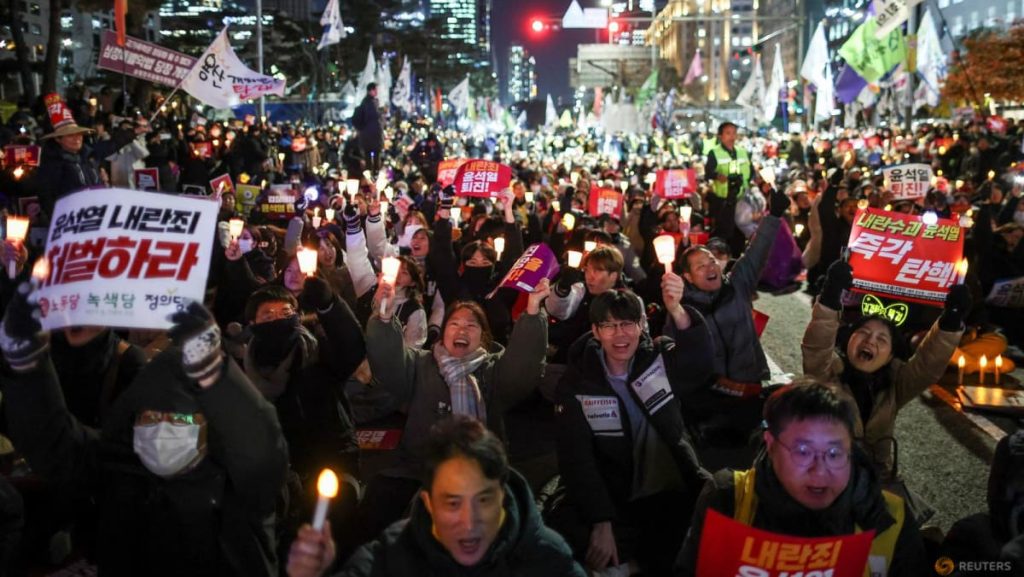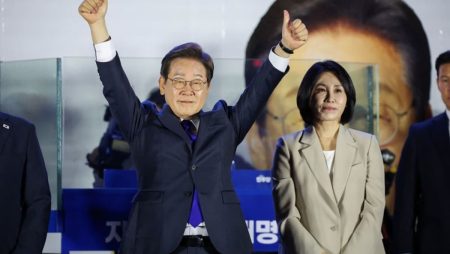The political climate in South Korea is reaching a boiling point as opposition leader Lee Jae-myung intensifies his calls for President Yoon Suk-yeol’s resignation amidst a looming impeachment vote. Lee’s impassioned plea centers on the escalating “guilt and responsibility” he attributes to Yoon’s continued presidency, urging him to take decisive action and avert a potentially damaging court ruling should the impeachment motion succeed. Lee’s argument paints a picture of a nation on the brink, its democratic foundations threatened by Yoon’s actions, with each passing moment exacerbating the perceived damage. This narrative underscores the urgency of the situation and attempts to rally support for the impeachment effort, portraying it as a necessary step to safeguard South Korea’s democratic principles.
Lee’s rhetoric strategically highlights South Korea’s remarkable journey from the shadows of colonialism and war to its current status as a prominent economic and democratic force in Asia. He juxtaposes this narrative of progress and global cultural influence, encompassing everything from the global phenomenon of K-pop to the nation’s Nobel laureate in literature, with Yoon’s recent declaration of martial law, framing it as an aberration that stains the nation’s hard-won achievements. This stark contrast serves to amplify the perceived severity of Yoon’s actions, positioning them as a betrayal of the nation’s progress and a threat to its democratic values. By invoking the nation’s proud history and cultural prominence, Lee seeks to galvanize public sentiment against the President and frame the impeachment vote as a pivotal moment in preserving South Korea’s legacy.
Central to Lee’s argument is the characterization of Yoon’s six-hour imposition of martial law, the first in over four decades, as an isolated incident, a momentary lapse in judgment rather than a reflection of a deeper, more systemic issue. He likens it to a “sudden fever,” a transient ailment swiftly overcome by the body’s natural defenses. This analogy aims to downplay the significance of the martial law declaration, portraying it as an anomaly within an otherwise healthy democratic system. This strategic framing seeks to reassure the public and international observers that South Korea’s democratic institutions remain robust and capable of weathering such challenges. It also subtly suggests that removing Yoon would effectively eradicate the “fever,” restoring the nation’s political health and stability.
Lee’s narrative further emphasizes the resilience of South Korea’s democracy and the wisdom of its citizens, attributing the swift rejection of the “absurd attempt at a military coup” to these inherent strengths. This characterization serves to bolster his argument for impeachment, suggesting that the people have already rendered their judgment on Yoon’s leadership. By portraying the public as the ultimate arbiters of political legitimacy, Lee seeks to legitimize the impeachment effort as a reflection of the popular will. He frames the vote not as a political maneuver but as a necessary response to the people’s clear desire for change, further pressuring lawmakers to align themselves with the perceived public sentiment.
The success of the impeachment motion hinges on securing the support of eight lawmakers from Yoon’s own ruling party, a challenging but not impossible feat according to Lee. While expressing growing confidence in achieving this crucial threshold, Lee acknowledges the uncertainty surrounding the final vote count. This admission of uncertainty adds a layer of suspense and underscores the high stakes involved in the impeachment process. It also subtly appeals to the wavering lawmakers within the ruling party, highlighting the potential consequences of their decision and implicitly urging them to consider the broader implications for the nation’s political future.
Lee’s final appeal to the ruling party lawmakers centers on the fundamental purpose of political representation, urging them to prioritize the “will of the people” above party loyalty. He contends that the public’s desire for Yoon’s removal is unequivocal and that lawmakers have a duty to heed this call. This appeal to conscience and principle aims to sway those lawmakers who might be torn between party allegiance and their responsibility to the electorate. By framing the impeachment vote as a choice between upholding democratic principles and clinging to partisan politics, Lee seeks to exert maximum pressure on the undecided lawmakers, urging them to prioritize the nation’s interests and act in accordance with the perceived will of the people. This final plea encapsulates Lee’s core argument, presenting the impeachment vote as a critical juncture for South Korean democracy, a moment where lawmakers must choose between loyalty and principle, between preserving the status quo and responding to the demands of the citizenry.










